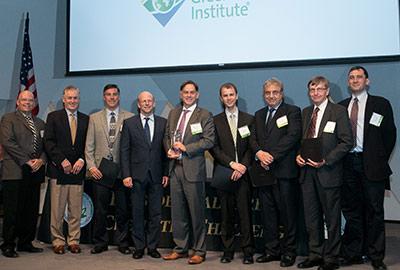Presidential Green Chemistry Challenge: 2015 Small Business Award
Renmatix
The Plantrose® Process: Supercritical Water as the Economic Enabler of Biobased Industry
 Jim Jones, Former Assistant Administrator of EPA's Office of Chemical Safety and Pollution Prevention, with awardees from RenmatixInnovation and Benefits: Renmatix in King of Prussia, Pennsylvania, is being recognized for developing a process using supercritical water to more cost effectively break down plant material into sugars used as building blocks for renewable chemicals and fuels. This innovative low-cost process could result in a sizeable increase in the production of plant-based chemicals and fuels, and reduce the dependence on petroleum fuels.
Jim Jones, Former Assistant Administrator of EPA's Office of Chemical Safety and Pollution Prevention, with awardees from RenmatixInnovation and Benefits: Renmatix in King of Prussia, Pennsylvania, is being recognized for developing a process using supercritical water to more cost effectively break down plant material into sugars used as building blocks for renewable chemicals and fuels. This innovative low-cost process could result in a sizeable increase in the production of plant-based chemicals and fuels, and reduce the dependence on petroleum fuels.
Summary of Technology: Traditional sugar sources, like corn and cane, are expensive feedstocks for producing relatively low value, high volume products like fuels and chemicals. Unfortunately, the traditional second generation technologies (acid, enzymes, and solvents) that were designed to extract these low value cellulosic sugars lack the practical economics to even compete with first generation sugars, let alone traditional petrochemical sources. In part, this is due to the capital expense of historical technologies like mineral acids and enzymatic processes that hydrolyze cellulosic feedstocks. This reality has severely limited the market adoption and broad integration of cellulosics.
Renmatix’s Plantrose® process, which uses supercritical water to deconstruct biomass, provides cost‐advantaged cellulosic sugars by using primarily water for conversion reactions. The two-step continuous process deconstructs a range of plant material into renewable feedstocks to produce separate streams of xylose and glucose. After sugar extraction, remaining lignin solids can be burned to supply the bulk of the heat energy required for the process (or utilized in higher-value applications like adhesives or thermoplastics).
In the first step, biomass and water are pumped together, heated, and fed into a fractionation reactor, where the hemicellulose is solubilized into a five-carbon sugar stream. In the second step, the cellulose and lignin that were filtered away from the initial sugar steam are pumped into the supercritical hydrolysis reactor. In the reactor, water acts as both a solvent and catalyst, decrystalizing and dissolving the cellulose and hydrolyzing the cellulose polymers. The temperature and pressure of the supercritical water system can be adjusted for very specific reaction condition control, enabling the use of smaller continuous reactors for large-scale commercial production.
Renmatix’s technological innovation, the use of water-based chemistry instead of enzymes, and/or acids, provides a cleaner, faster, and lower-cost method for deconstructing biomass into cellulosic sugars. Those sugars become the building blocks for a multitude of renewable downstream technologies to serve significant biochemical market demand – and begin providing meaningful volumes of plantrochemicals, in lieu of the conventional petroleum-derived equivalents. Renmatix partners and customers will build their own biorefineries by licensing the Plantrose® process to convert locally available biomass into cellulosic sugars, enabling profitable scale-up of biochemical, cellulosic ethanol, and advanced biofuels markets worldwide.
Other resources:
- Learn more about green chemistry.
- Learn more about the Plantrose® process on Renmatix’s website.Exit
Note: Disclaimer
Return to the list of all winners including the 2015 Award Winners.
